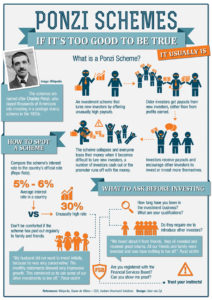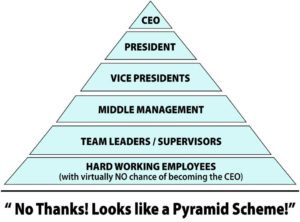

Scalability
Now that we’ve talked about the functions of platforms, we can start discussing the method of monetizing available platforms and in order to do that, we need to unpack the fundamentals of business models. While this may not seem super intriguing to you, the business model used is crucial in the ability to scale.
Scalability is critical to long term success. Unpacking business models may not seem glamorous, but if you don’t understand how a business model works, you won’t know how to utilize a platform properly. Best case scenario you won’t understand how scalable a platform is and worse case scenario you could end up participating in illegal Ponzi schemes or pyramid scams, which could result in large fines and jail time!
PONZI SCHEMES
Here is what a Ponzi Scheme is as defined by The U.S. Security and Exchange Commissions, “A Ponzi scheme is an investment fraud that involves the payment of purported returns to existing investors from funds contributed by new investors. Ponzi scheme organizers often solicit new investors by promising to invest funds in opportunities claimed to generate high returns with little or no risk. In many Ponzi schemes, the fraudsters focus on attracting new money to make promised payments to earlier-stage investors to create the false appearance that investors are profiting from a legitimate business” (https://www.sec.gov/fast-answers/answersponzihtm.html).
Ponzi Schemes are illegal and will get you thrown into jail. Unfortunately many people have been victimized by a lack of knowledge. There are some great red flag warnings if you follow the link we referenced right above that can help you avoid Ponzi Scheme Pitfalls.





PYRAMID SCAMS
MLM platforms are often misidentified as illegal pyramid scams. While MLM platforms do typically incorporate a legal corporate business model (more on that below!), the S.E.C. provides some great information to help people avoid illegal Pyramid Scams.
“Pyramid schemes masquerading as MLM programs often violate the federal securities laws, such as laws prohibiting fraud and requiring the registration of securities offerings and broker-dealers. In a pyramid scheme, money from new participants is used to pay recruiting commissions (that may take any form, including the form of securities) to earlier participants just like how, in classic Ponzi schemes, money from new investors is used to pay fake “profits” to earlier investors. Recently, the SEC has sued the alleged operators of large-scale pyramid schemes for violating the federal securities laws through the guise of MLM programs” (https://www.sec.gov/oiea/investor-alerts-bulletins/investor-alerts-ia_pyramidhtm.html).
PYRAMID SCAMS VS. MLM
A major difference between illegal Pyramid Scams and legitimate MLM companies is that in a illegal Pyramid Scam, no real product is sold and people are PAID to recruit new members. Now most of the time people refer to Multi-level-Marketing as illegal pyramid scams, that is not correct. There are many legitimate MLM platforms out there, BUT, the vast majority utilize a corporate business model where the most benefit is for those who are on top and those underneath them are just trying to reach some resemblance of success the person who recruited them has had.
These business models ensure the profits flow to the person at the top and find it’s way back down, and you aren’t able to earn more then the person “above you.” While the pitch is financial freedom, the sad reality is that although some become very successful, the vast majority will never attain the freedom they are looking for.



CORPORATE BUSINESS MODELS
The corporate business model is what is most commonly used in traditional business today. While the specifics of compensation plans vary from business to business, the overall theme is the same, money flows to the top and trickles back down. It pushes money to the top (owners, board members, executives etc.) and the value beneath is based on what they determine a position is worth, NOT what you are worth!
While this model is beneficial to those at the top, there is little incentive for the newbie joining the company. With no hope of earning more then the person above you, you either take your experience and move to another company, or, wait until the spot above you is vacated and compete for the position. This business model encourages competition NOT collaboration! Here is an excellent article about the pitfalls of the common corporate business model. https://www.entrepreneur.com/article/324997
PROFIT SHARING BUSINESS MODEL
Here at The Jubilee Initiative, we don’t utilize ANY of the above business models! Instead, we utilize a profit sharing business model that is based on equal opportunity, no matter if you are part of the founding members, or, brand new looking for better ways to generate income. This means you determine what you want your revenue stream to generate!
The simplest and quickest way to explain how an equal opportunity business model works is to think of a franchise business model. Franchises are owned by various owners and the revenue generated by each franchise store will depend on the method used by each business owner. One franchise store does not determine the revenue of another franchise store, so each stores revenue will depend on the volume flowing through it.
Under the APPLICATION AND METHOD tab, we will explain in greater depth how we utilize a profit sharing business model to grow and scale individual accounts. What we really enjoy about this business model is that OUR success is tied to YOUR success, so it creates an environment where it is beneficial to work together in collaboration instead of competing against one another! Helping your volume grow helps everyone!




